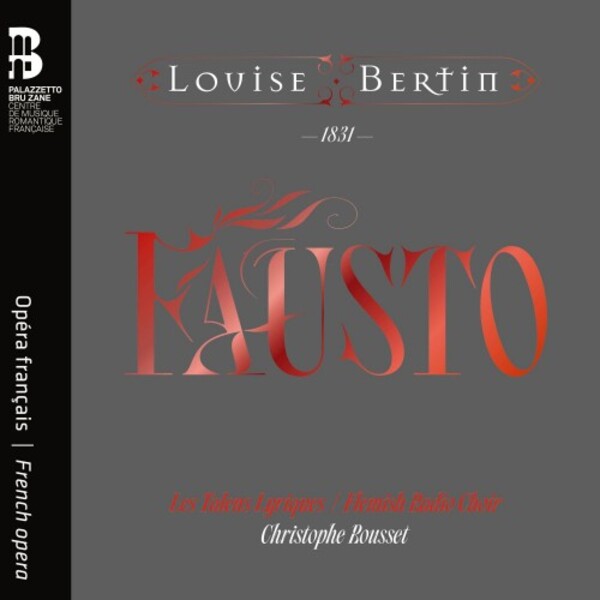BERTIN Fausto (Rousset)
View record and artist detailsRecord and Artist Details
Genre:
Opera
Label: Bru Zane
Magazine Review Date: 02/2024
Media Format: CD or Download
Media Runtime: 125
Mastering:
DDD
Catalogue Number: BZ1054

Tracks:
| Composition | Artist Credit |
|---|---|
| Fausto |
Louise Bertin, Composer
(Les) Talens Lyriques Ante Jerkunica, Mefistofele, Bass Christoph Rousset, Conductor Diana Axentii, Witch; Marta, Mezzo soprano Flemish Radio Choir Karina Gauvin, Margarita, Soprano Karine Deshayes, Fausto, Mezzo soprano Marie Gautrot, Catarina, Mezzo soprano Nico Darmanin, Valentino, Tenor Thibault de Damas d’Anlezy, Wagner; Town Crier, Bass-baritone |
Author: Tim Ashley
When Fausto was first performed at the Théâtre-Italien in Paris in March 1831, there was much comment in the press, some of it snide, about the fact that its composer was a woman. Louise Bertin (1805 77) was a pupil of Reicha, a friend of Berlioz and daughter of Louis-François Bertin, the influential editor of the Journal des débats, and questions were therefore asked in rival newspapers as to whether Goethe’s Faust, Part 1 was an appropriate subject for ‘the politeness of a woman’s imagination’, and conventional gender polarities were evoked in double-edged criticism that claimed Bertin’s ‘talent … has nothing feminine about it’ and that ‘her sensibility is brimming with energy and masculine vigour’. The opera itself was not revived after its opening run, and for many years was known only through a defective vocal score that omitted the recitatives. The recent discovery of Bertin’s autograph in the Bibliothèque Nationale, however, paved the way for performances in Paris last year and Christophe Rousset’s wonderful new recording with Les Talens Lyriques.
It’s a remarkable achievement. Unlike with many female composers, Bertin’s career was fostered by her family, her father in particular, though eventually there were ugly charges of nepotism when her 1836 opera La Esmeralda (based on Notre-Dame de Paris, and to a libretto by Hugo himself) was premiered at the Opéra: Bertin never composed for the stage again. She was only 25 when Fausto was completed, and you cannot help but be struck by its originality and assurance. An accomplished poet, she wrote the Italian libretto herself, and the adaptation is fascinating when placed beside later works by Berlioz, Gounod and Boito. Some of the big Goethean set pieces are omitted: there are no Songs of Rats, Fleas and Kings of Thule, for instance, no equivalent of ‘Meine Ruh ist hin’. Fausto is rejuvenated not by Mefistofele (as in Berlioz, Boito etc) but (as in Goethe) by a horror-comic Witch in their kitchen, though Bertin drops the subsequent Walpurgisnacht episodes, which means the narrative’s supernatural elements are exhausted early, clearing the way for the main love story. The central focus of the latter, however, tellingly lies not in the eroticism of seduction (Boito and Gounod again) but in an emotionally excruciating depiction of Margarita’s social ostracism after her desertion, more unsettling and protracted than any version by a male composer.
In a recent interview (11/22), Rousset described the score as like ‘noisy Mozart, and sometimes more like Weber, very Romantic’, and there are indeed echoes of Don Giovanni and Freischütz in the baleful brass-writing and repeated string tremolandos. But there is also much of Méhul’s and Berlioz’s experimentalism in Bertin’s creepy orchestration and harmony, and her harsh, rhythmically violent depiction of the demonic is far removed from the scherzando diablerie of Berlioz, Boito and Liszt, which derives in part from Meyerbeer’s Robert le diable, also premiered in 1831, its success perhaps instrumental in Fausto’s rapid disappearance from the repertory.
The performance is a knockout. Rousset conducts with blazing conviction, admirably sustaining the high emotional pitch without once tipping towards melodrama. We know a tenor sang Fausto at the premiere, but when the autograph came to light it was discovered that Bertin had originally written the role for a mezzo, and Rousset accordingly casts Karine Deshayes, admirably stylish and perfectly at ease over what proves to be a formidable vocal range. Margarita needs a dramatic bel canto soprano, particularly in the work’s arduous second half, and Karina Gauvin rises to the challenge with admirable intensity. Ante Jerkunica is similarly outstanding as Mefistofele, ironic, very sexy and at times unspeakably malign, while Nico Darmanin does fine things as Margarita’s brother Valentino, a role at once cruelly taxing and deeply ungrateful. Les Talens Lyriques and the Flemish Radio Choir are on tremendous form throughout. It’s a terrific set and a major rediscovery. Do listen to it.
Discover the world's largest classical music catalogue with Presto Music.

Gramophone Digital Club
- Digital Edition
- Digital Archive
- Reviews Database
- Full website access
From £8.75 / month
Subscribe
Gramophone Full Club
- Print Edition
- Digital Edition
- Digital Archive
- Reviews Database
- Full website access
From £11.00 / month
Subscribe
If you are a library, university or other organisation that would be interested in an institutional subscription to Gramophone please click here for further information.




